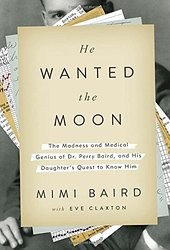"He Wanted The Moon" is the latest memoir novel that uncovered the life and struggles of the late Dr. Perry Baird, a Texan-native medical practitioner trainee in Harvard.
Baird's daughter, Mimi Baird, deemed it essential to unveil her father's challenges in life, The New York Times report. The medical practitioner was inflicted at the time with severe bipolar disorder until he passed away.
Perry abandoned Mimi when she was a young child. She saw him for the last time when she was in her teens. Mimi never saw her troubled father again after that until his death in 1959. Mimi came across a package 20 years ago that brought her father's memories back, though. This package, in turn, inspired her to write the Perry Baird memoir, "He Wanted The Moon", as a 70-year old medical administrator retiree.
The package is a collection of journal documents in which Perry revealed his darkest moments with mood swings. Through these papers, Mimi got to unveil and learn of her late father's horrible moments of depression and, at times, violent behavior, that eventually caused him to lose his profession and form family estrangement.
Mimi depicted the mental ward authorities' statements based on the recovered documents, as revealed by Boston Globe, which state, "The patient . . . completely destroyed several iron hospital beds, broke the panels from the door of his room, broke the sashes from the window, dismantled the window casing and with a window weight in each hand was very threatening toward the employees but did not strike them."
The unforgettable novel inspires many people to love and accept mentally ill loved ones with compassion. Just like Mimi, "He Wanted The Moon" readers motivate themselves to help mentally afflicted family members overcome life's challenges. Instead of harboring ill feelings, Ms. Baird has invested care and understanding to her father's memories through the decades that passed.
Mimi inspires many that there is hope in getting through a mental illness. In this memoir novel, readers learn of Perry's downfalls. Towards the end of the novel, readers come to terms with their own ways of helping loved ones similarly afflicted with severe bipolar disorder.




























